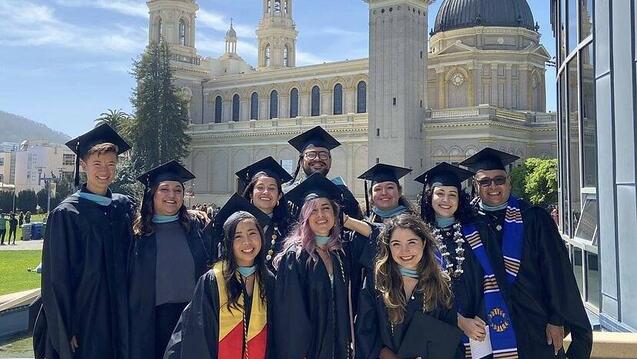Childhood Anxiety Detection Breakthrough: EEG Analysis Can Detect Risk for Anxiety Disorders in Children by Seven Years Old
SAN FRANCISCO (August 2, 2023) -- A newly published study in the journal Frontiers in Psychiatry titled ‘A biomarker discovery framework for childhood anxiety’ suggests that latent factors extracted from electroencephalogram (EEG) recordings in childhood are promising candidate biomarkers for anxiety disorders and for externalizing disorders. This study found that appropriate age was important - with accuracy improving up to seven years of age for anxiety and three to five years of age for externalizing disorders (primarily ADHD). The study also suggests that anxiety emerges later than some other neurodevelopmental disorders.
The study was led by University of San Francisco (USF) Professor William Bosl, PhD, director of the USF Center for AI and Medicine and professor of Health Informatics, and co-first author Dr. Michelle Bosquet Enlow, together with colleagues at Harvard Medical School and Boston Children’s Hospital, where Dr. Bosl holds affiliate faculty appointments.
“Until now, it’s been widely accepted that anxiety disorders can only be effectively diagnosed after the emergence of clinical symptoms, which results in missed opportunities to intervene during critical formative periods,” stated Bosl. “Our study shows that EEG recordings contain information about brain function that is useful for early detection of childhood anxiety disorders, creating new opportunities for early detection and intervention. Importantly, new technical advances will soon make EEG widely available as a low-cost, easy-to-administer, time-efficient brain measurement method that could be included in routine clinical practice, transforming opportunities for wide screening for risk and preventative intervention. With childhood anxiety disorders on the rise, these findings come at a critical time.”
EEG recordings from two (5, 7 years) or three (3, 5, 7 years) sessions gave much better results than 7-year recordings alone, suggesting a developmental trajectory for anxiety disorders. However, the 7-year recordings were essential to detection. EEG recordings in the first year of life were not predictive of future anxiety outcomes.
The paper was co-authored by:
- Michelle Bosquet Enlow, Department of Psychiatry and Behavioral Sciences, Boston Children’s Hospital, and Department of Psychiatry, Harvard Medical School
- Charles Nelson, PhD, director of the Laboratories of Cognitive Neuroscience at Boston Children’s Hospital, the Department of Pediatrics at Harvard Medical School and the Harvard Graduate School of Education
- Eric F. Lock, Division of Biostatistics, School of Public Health, University of Minnesota
The study was supported by the National Institute of Mental Health (R01MH078829), the Koret Foundation through the University of San Francisco, the Tommy Fuss Center for Neuropsychiatric Disease Research, the Program for Behavioral Science, Department of Psychiatry and Behavioral Sciences, Boston Children’s Hospital, and the National Institute of General Medical Sciences (R01GM130622).
Journalists interested in speaking with study author William Bosl, PhD should contact Kellie Samson at (415) 601-1915 or ksamson@usfca.edu.
About the USF Center for AI and Medicine
The USF Center for AI and Medicine (CAIM) brings together faculty and staff from both the College of Arts and Sciences and the School of Nursing and Health Professions, together with clinical partners to develop computational algorithms to enable holistic personalized healthcare. CAIM has particular expertise and focus on mental, neurological, and neurodevelopmental disorders and their role in health through the lifespan.
About the USF School of Nursing and Health Professions
The mission of the USF School of Nursing and Health Professions is to improve the health of all populations through equitable and compassionate service, value-driven research, and innovative education of health professionals, preparing them to use their hearts, minds, and souls to change the health of the world. For more information, visit our website.
About the USF Data Institute
Leading the way in the field of applied data science, the USF Data Institute serves as the umbrella organization for cross-disciplinary research, academic programs, and ongoing learning. Through its efforts, the institute cultivates partnerships with private enterprises, public institutions, and nonprofit entities, collectively addressing some of the most urgent challenges of our era. The institute also houses specialized initiatives dedicated to Environment and Social Impact, the Center for Artificial Intelligence and Medicine (CAIM), focusing on the fusion of AI and healthcare, as well as the Center for Applied Data Ethics (CADE), which delves into ethical dimensions of data utilization. For more information, visit our website.
About the University of San Francisco
The University of San Francisco is a private, Jesuit Catholic university that reflects the diversity, optimism, and opportunities of the city that surrounds it. USF offers more than 230 undergraduate, graduate, professional, and certificate programs in the arts and sciences, business, law, education, and nursing and health professions. At USF, each course is an intimate learning community in which top professors encourage students to turn learning into positive action, so the students graduate equipped to do well in the world — and inspired to change it for the better. For more information, visit usfca.edu.
About Boston Children’s Hospital
The research enterprise at Boston Children’s Hospital, comprising more than 3,000 researchers, is the largest and most highly funded pediatric research hospital in the world. Our work is fueled by a deep understanding of disease biology coupled with world-class discovery platforms, including genetics and genomics, gene editing, bioinformatics, proteomics, bioengineering, image analysis, biobanks, disease-specific stem cell lines, and a range of animal models. We have special expertise in rare disease discovery, a robust Translational Research Program and large, diverse patient populations for clinical research and trials. For more information, visit BCH Research.


